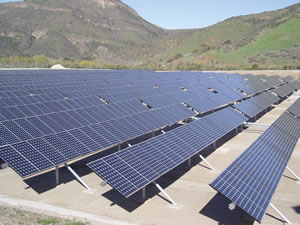Thousand Oaks - Solar and Cogeneration
« Return to List of Projects

This 584 kW tracking solar project started in April of 2007 provides about 15% of the facility's overall electrical demand, and during summer months of peak demand when combined with the cogeneration project, grid supplied energy is reduced to zero at times. A cogeneration project started in April of 2007 uses methane gas created through the facility's anaerobic digestion process to provide fuel to three 250 kW Mann engines. When both projects are combined, renewable energy generation at the plant provides for over 50% of the plant's daily electrical usage.
Both projects received grants from the CPUC Self Generation Incentive Plan program, $1,500,000 for solar, and $500,000 for cogeneration. In a unique private/public partnership, neither project is owned by the city and no city funds were used to construct them. Renewable energy is acquired through a power purchase agreement by the solar and cogeneration facility owners.
Estimated annual energy savings of the combined projects over grid provided electricity is anticipated to be $100,000 initially with more savings anticipated in the future. Currently, plans are underway to upsize the cogeneration system to provide 100% of the facility's electrical needs.
The Hill Canyon Treatment Plant (HCTP) operates the largest solar facility of its kind in Ventura County. This 500 kW solar system offsets 13% of the facility's electrical costs at a time when electricity is most expensive.
The three projects total 11,685,840 kWh worth of electricity that does not have to be produced using additional power from the grid.
HCTP generates 50% of its electrical load by burning methane gas created in its anaerobic digesters. The goal is to eventually create all of the renewable energy needed to run the facility. Both the cogeneration and solar systems came as a result of power purchase agreements that did not require any up front funding by the City. Both projects combined are expected to save $200,000 annually.
HCTP extensively uses alternative fuel vehicles, which include electric carts for in-plant transportation, and a fleet of hybrid, natural gas, and conventional gasoline burning vehicles. Two natural gas powered carpool vans ferry employees to and from work, decreasing pollution and excess traffic.
Public education concerning clean effluent at the HCTP begins with an informed citizenry that does not introduce hazardous or inappropriate chemicals into the sewer system. City Industrial Wastewater Pretreatment Program employees work with the business community to ensure that discharges are non-toxic and suitable for recycling.









